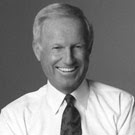
This week at this time each afternoon I'm going to address the unemployment/employment issue.
First off Words of Wisdom from Harvey Mackay:
Harvey Mackay's Column This Week
Look beyond human resources to find a job
By Harvey Mackay
A big stack of my mail comes from frustrated people who have tried very hard to find jobs without success. With the slow economic recovery, it's still mighty tough out there.
As I researched my last book, Use Your Head To Get Your Foot in the Door: Job Search Secrets No One Else Will Tell You, I frequently heard concerns from people who were upset at human resources departments. One person said that of the more than 300 résumés he's sent out for jobs for which he was qualified, he's only heard from 17, positive or negative. He was hoping for some better feedback so he could improve his employment odds.
HR people don't deserve the bad rap. Let me shed a little light on the subject. First, you have to realize that human resources is not a profit center and because of that, they will often be short staffed. When cuts occur, human resources is among the first to be hit.
For example, here at MackayMitchell Envelope Company, we have one HR manager to service our three plants. Our company recently received 900 applications for one position. And that was through e-mail alone. There were hundreds of applications sent through the mail as well.
Being an envelope guy, it pains me to say this but my advice is to always e-mail your résumé. It's much easier to get a response. You will seldom get a response if you mail your résumé. Don't sabotage your chances, because the amount of paperwork that is handled by human resources is astounding.
Be aware that big companies have software that scans résumés for key words, so use language that computes. Use key words in your résumé that tie in with the requirements of the position. You may need to tailor your résumé for each job. Be specific and clear about your credentials. Don't send out résumés blindly. Write to make sense to both the software and a human reader. At some point you will need to win the hearts and minds of real human beings.
Always try to differentiate yourself. Don't be boring. Don't be predictable. Don't be just another candidate. Stand out. Be different. Use a little creativity.
Your résumé has one purpose: to win an interview. Focus on the employer's needs, not yours.
If you are fortunate enough to get a job interview, pay particular attention to how your résumé is read and physically handled by an interviewer.
- If the description of a particular phase of your career or some other section of your résumé is constantly being questioned, you almost certainly need to improve the statement. Listen carefully. It's not enough to know that something is troubling people. You need to find out what in particular is bothering them.
- Do readers find it hard to follow the organization of your résumé? Are they constantly jumping between pages or paragraphs when they read it?
- Do interviewers find the language hard to penetrate? In an interview, are you constantly being asked to restate what you are saying? In particular, do they take your description of a position and restate it in terminology which uses more mainstream language?
- Is the information clearly laid out and presented in an appealing and inviting way?
The great dilemma is that you are unlikely to find out you have a poor résumé because -- if it's bad -- you won't get an interview in the first place.
In addition, in these times HR staffs are overwhelmed with requests from people who are just looking for jobs to meet unemployment requirements. HR personnel want serious candidates who meet the job criteria.
Remember too that HR departments have many other functions besides screening and hiring candidates. They must also focus on benefits management, staffing issues, compliance with state and federal rules, among other duties.
My #1 piece of advice is to try to find the person doing the hiring in the company and contact him or her. You will still have to eventually go through HR, but if you can get someone to shepherd your application/résumé, you have a much better chance of landing the job.
Mackay's Moral: The purpose of your résumé is to enable you to resume work.

Big Companies don't care, they only care about their buddies' drinking buddies having jobs. It's let hit the bars and get plastered after work, so we will hire only so and so. I have over 50 versions of my resume and use key words, each and every time. I send my resume by e-mail and usually have a key contact to sheperd my resume, but I still can't get in! I am incredibly bright and resilant, and will literally work my fingers to the bone, yet at the end of the day, I am individual that believes in work more than friends, so that gets me nowhere.
ReplyDeleteI get what you are saying, but the best jobs don't require resumes, it's about relationships.
ReplyDeleteAnd while I've seen drinking buddies promote each other over more qualified people, when a company needs to hire someone, they want the best they can find and afford.